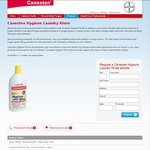Similar deal expired last year, but looks like it's been relaunched.
Break the cycle of cross-contamination and re-infection with Canesten Hygiene Rinse by adding it in your wash. People suffering from bacterial or fungal infections may deposit large quantities of bacteria or fungal spores in shared laundry. Such items include towels, bed linen and personal items, like socks and underwear.
Normal washing, especially at cold temperatures, may not completely remove the bacteria or fungal spores. This often leads to the bacteria and fungal spores being passed on to other garments, and ultimately re-infection or cross infection.
Canesten Hygiene Rinse can break the cycle of re-infection and cross infection by helping to eliminate fungal spores that can remain in your clean washing increasing the risk of re-infection. Canesten Hygiene Rinse leaves laundry hygienically clean to help to keep families healthy.
Available in 1L bottles at supermarkets.


Great post, TA, thanks.